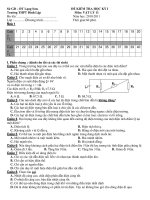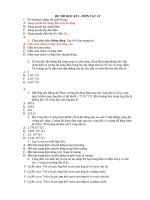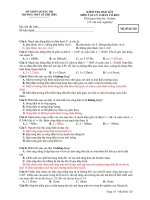- Trang chủ >>
- Sư phạm >>
- Sư phạm vật lý
Đề tham khảo học kì I môn Vật lý 11 và tiếng Anh 12
Bạn đang xem bản rút gọn của tài liệu. Xem và tải ngay bản đầy đủ của tài liệu tại đây (156.46 KB, 4 trang )
<span class='text_page_counter'>(1)</span><div class='page_container' data-page=1>
1
SỞ GD&ĐT BẮC NINH
<b>TRƯỜNG THPT THUẬN THÀNH SỐ 1 </b>
<b>Mã đề: 314 </b>
<b>ĐỀ KIỂM TRA ĐỊNH KÌ </b>
<b>MƠN: Tiếng Anh 12 </b>
Thời gian làm bài: 60 phút
<i>(Đề thi có 50 câu trắc nghiệm) </i>
Họ và tên:... Số báo danh: ...
<i><b>Mark the letter A, B, C, or D on your answer sheet to indicate the most suitable response to complete each of the </b></i>
<i><b>following exchanges. </b></i>
1. Pat is carrying some heavy bags when Bruce arrives.
Bruce: “Would you like some help?”
Pat: “_____”.
a. Sure, I will b. Yes, please c. No, I bet you wouldn’t d. What makes you think so.
2. Mr. Hill is speaking to his secretary, Melanie.
Mr. Hill: “When will you give me the detailed assessment of the situation?”
Melanie: “_____”.
a. As soon as you can. b. Sure, I’ll read it when you do it.
c. Is Thursday all right? d. You could say that again.
<i><b>Mark the letter A, B, C, or D on your answer sheet to indicate the word(s) OPPOSITE in meaning to the underlined </b></i>
<i><b>word(s) in each of the following questions. </b></i>
<b>3. In spite of the Council’s offer, some residents are still stubborn and refuse to move. </b>
a. obstinate b. reluctant c. unsympathetic d. obedient
<b>4. The country, with its own economic problems, has grown stingy with its financial aids. </b>
a. generous b. greedy c. cautious d. selfish
<i><b>Mark the letter A, B, C, or D on your answer sheet to indicate the word(s) CLOSEST in meaning to the underlined </b></i>
<i><b>word(s) in each of the following questions. </b></i>
<b>5. A number of fans had been ejected from the stadium for causing trouble. </b>
a. thrown out of b. looked down on c. come up with d. put up with
<b>6. The students asked for some help with the electric wire- could you see to it? </b>
a. reply to b. get over c. deal with d. agree to
<i><b>Mark the letter A, B, C, or D on your answer sheet to indicate the correct answer to each of the following questions. </b></i>
7 “These bears are _____ !” whispered the grinning tenant to his customers on Sunday morning.
a. on the shelf b. on the house c. on the rocks d. on the carpet
8. Jack was looked _____ by others because he is so poor.
a. out for b. up to c. down on d. into
9. The manager is determined to _____bribery.
a. put the stop to b. put stop to c. put stops to d. put a stop to
10. His financial problems _____from the difficulties he encountered in the recession.
a. stem b. flourish c. root d. sprout
11. Rose is said _____her memory.
a. to have been lost b. to be lost c. to lose d. to have lost
12. _____the lessons well, Adrian couldn’t answer the teacher’s questions.
a. Didn’t prepare b. Having prepared c. Preparing not d. Not preparing
13. She hates those who are not _____ for appointment. She doesn’t want to wait.
a. punctually b. punctual c. punctuality d. punctuate
14 Some researchers believe that the _____ family is rapidly becoming common in recent years
a. basic b. closed c. immediate d. nuclear
15. Many people who attended Mr. Jack’s performance _____him for many years.
a. didn’t see b. wouldn’t see c. haven’t seen d. hadn’t seen
16. _____Jack got top grades at Vaucluse High School, he never went to university.
a. nevertheless b. despite c. although d. meanwhile
17. The clinician asked Mr. Jack to keep _____fried food for great amount of fat.
a. off b. at c. back d. up
18. Rose is an expert _____Music.
a. at b. with c. in d. of
<i><b>Read the following passage and mark the letter A, B, C, or D on your answer sheet to indicate the correct answer to </b></i>
<i><b>each of the questions. </b></i>
Learning means acquiring knowledge or developing the ability to perform new behaviors. It is common to think of
learning as something that takes place in school, but much of human learning occurs outside the classroom, and people
continue to learn throughout their lives.
</div>
<span class='text_page_counter'>(2)</span><div class='page_container' data-page=2>
2
They learn how to interact with their parents, siblings, friends, and other people important to their world. When they enter
school, children learn basic academic subjects such as reading, writing, and mathematics. They also continue to learn a
great deal outside the classroom. They learn which behaviors are likely to be rewarded and which are likely to be
punished. They learn social skills for interacting with other children. After they finish school, people must learn to adapt
to the many major changes that affect their lives, such as getting married, raising children, and finding and keeping a job.
Because learning continues throughout our lives and affects almost everything we do, the study of learning is
important in many different fields. Teachers need to understand the best ways to educate children. Psychologists, social
workers, criminologists, and other human-service workers need to understand how certain experiences change people’s
behaviors. Employers, politicians, and advertisers make use of the principles of learning to influence the behavior of
workers, voters, and consumers.
Learning is closely related to memory, which is the storage of information in the brain. Psychologists who study
memory are interested in how the brain stores knowledge, where this storage takes place, and how the brain later
<b>retrieves knowledge when we need it. In contrast, psychologists who study learning are more interested in behavior and </b>
how behavior changes as a result of a person’s experiences.
There are many forms of learning, ranging from simple to complex. Simple forms of learning involve a single
<i>stimulus. A stimulus is anything perceptible to the senses, such as a sight, sound, smell, touch, or taste. In a form of </i>
learning known as classical conditioning, people learn to associate two stimuli that occur in sequence, such as lightning
followed by thunder. In operant conditioning, people learn by forming an association between a behavior and its
consequences (reward or punishment). People and animals can also learn by observation - that is, by watching others
perform behaviors. More complex forms of learning include learning languages, concepts, and motor skills.
19. According to the passage, which of the following is learning in broad view comprised of?
a. Knowledge acquisition outside the classroom
b. Acquisition of social and behavioral skills
c. Acquisition of academic knowledge
d. Knowledge acquisition and ability development
20. According to the passage, what are children NOT usually taught outside the classroom?
a. interpersonal communication b. life skills
c. literacy and calculation d. right from wrong
21. Getting married, raising children, and finding and keeping a job are mentioned in paragraph 2 as examples of ______.
a. the changes to which people have to orient themselves
b. the situations in which people cannot teach themselves
c. the ways people’s lives are influenced by education
d. the areas of learning which affect people’s lives
22. Which of the following can be inferred about the learning process from the passage?
a. It becomes less challenging and complicated when people grow older
b. It plays a crucial part in improving the learner’s motivation in school
c. It takes place more frequently in real life than in academic institutions
d. It is more interesting and effective in school than that in life
23. According to the passage, the study of learning is important in many fields due to ______.
a. the need for certain experiences in various areas
b. the exploration of the best teaching methods
c. the great influence of the on-going learning process
d. the influence of various behaviors in the learning process
24. It can be inferred from the passage that social workers, employers, and politicians concern themselves with the study
of learning because they need to ______.
a. change the behaviors of the objects of their interest towards learning
b. thoroughly understand the behaviors of the objects of their interest
c. make the objects of their interest more aware of the importance of learning
d. understand how a stimulus relates to the senses of the objects of their interest
<b>25. The word “retrieves” in paragraph 4 is closest in meaning to _______. </b>
a. generates b. creates c. recovers d. gains
<b>26. The word “they” in paragraph 2 refers to _____. </b>
a. toys b. people c. children d. objects
<i><b>Mark the letter A, B, C, or D on your answer sheet to indicate the word whose underlined part differs from the other </b></i>
<i><b>three in pronunciation in each of the following questions. </b></i>
27. a. risen b. driven c. brighten d. written
28. a. economy b. economics c. ecology d. philosophy
<i><b>Mark the letter A, B, C, or D on your answer sheet to indicate the word that differs from the other three in the position </b></i>
<i><b>of primary stress in each of the following questions. </b></i>
29. a. reckon b. recap c. recede d. recent
</div>
<span class='text_page_counter'>(3)</span><div class='page_container' data-page=3>
3
<i><b>Mark the letter A, B, C, or D on your answer sheet to indicate the underlined part that needs correction in each of the </b></i>
<i><b>following questions. </b></i>
31. (a) Certain health education topics such as bereavement, (b) child abuse and education for parenthood (c) was omitted
by (d) large numbers of schools.
32. (a) In purchasing a (b) winter coat, it is very important (c) for trying it on with (d) heavy clothing underneath.
33. Raymond Chandler’s (a) detectives stories are (b) admired both by critics (c) and general (d) readers.
<i><b>Mark the letter A, B, C, or D on your answer sheet to indicate the sentence that is CLOSET in meaning to each of the </b></i>
<i><b>following questions. </b></i>
34. For some people, the word “England” may still conjure up images of pretty gardens and tea parties.
a. The word “England” provides pretty gardens and tea parties for some people.
b. The word “England” reminds some people of pretty gardens and tea parties.
c. Images of pretty gardens and tea parties inspire some people with the word “England”.
d. Some people often think of “England” as pretty gardens and tea parties.
35. Although he ran very quickly, he could not catch up with the leading runner.
a. He could not catch up with the leading runner as he ran very quickly.
b. In order to catch up with the leading runner, he ran very quickly.
c. Running very quickly resulted in his catching up with the leading runner.
d. However fast he ran, he could not catch up with the leading runner.
36. He hated being in the army because he had to obey commands.
a. All that he hated being in the army because he had to obey commands.
b. Having to obey commands was more than what he hated being in the army.
c. His loathing of being in the army was due to having to obey commands.
d. He hated being in the army; that’s why he didn’t obey commands.
<i><b>Read the following passage and mark the letter A, B, C, or D on your answer sheet to indicate the correct word or </b></i>
<i><b>phrase that best fits each o f the numbered blanks from 24 to 28. </b></i>
Human beings have a strong need to put their experiences and problems into words. That is why everyone (37)_____ a
“friendly ear”- someone who is willing to listen to their troubles and joys. But few people (38)_____ what a complex skill
listening is. To be a good listener requires great powers of concentration, which can only be gained through practice.
There are two reasons why listening is often such hard (39)_____ The first is simply that people much prefer to
speak. How often have you missed what someone has said because you were thinking about what you were going to say
(40)_____ The second reason is that people speak too slowly. The average speed is about 125 words per minute,
(41)_____ not fast enough for the human brain. It allows too much time for the concentration to fail, as the brain tries to
keep itself busy with other, irrelevant thoughts.
37. a. approves b. attracts c. appreciates d. applauds
38. a. realize b. relate c. believe d. detect
39. a. task b. work c. act d. job
40. a. in turn b. in reply c. through answer d. by report
41. a. this b. that c. which d. what
<i><b>Mark the letter A, B, C, or D on your answer sheet to indicate the sentence that best combines each pair of sentences </b></i>
<i><b>in the following questions. </b></i>
42. They live in a house. The roof of the house may collapse at any moment.
a. They live in a house which roof may collapse at any moment.
b. They live in a house, its roof may collapse at any moment.
c. They live in a house, their roof may collapse at any moment.
d. They live in a house whose roof may collapse at any moment.
43. Someone had told the officer about the risk of being arrested. He fled to another country.
a. The officer fled to another country before being told about the risk of being arrested.
b. Having been told about the risk of being arrested, the officer fled to another country.
c. Despite being told about the risk of being arrested, the officer fled to another country.
d. Not until he fled to another country had the officer been told about the risk of being arrested.
<i><b>Read the following passage and mark the letter A, B, C, or D on your answer sheet to indicate the correct answer to </b></i>
<i><b>each of the questions. </b></i>
Human Nutrition is the study of how food affects the health and survival of the human body. Human beings require
food to grow, reproduce, and maintain good health. Without food, our bodies could not stay warm, build or repair tissue,
or maintain the heartbeat. Eating the right foods can help us avoid certain diseases or recover faster when illness occurs.
These and other important functions are fueled by chemical substances in our food called nutrients. Nutrients are
classified as carbohydrates, proteins, fats, vitamins, minerals, and water.
</div>
<span class='text_page_counter'>(4)</span><div class='page_container' data-page=4>
4
acids liquefy food and muscle contractions push it along the digestive tract. Nutrients are absorbed from the inside of the
small intestine into the bloodstream and carried to the sites in the body where they are needed. At these sites, several
chemical reactions occur, which ensures the growth and function of body tissues. The parts of foods that are not absorbed
continue to move down the intestinal tract and are eliminated from the body as feces.
<b>Once digested, carbohydrates, proteins, and fats provide the body with the energy it needs to maintain its many </b>
functions. Scientists measure this energy in kilocalories, the amount of energy needed to raise one kilogram of water one
degree Celsius. In nutrition discussions, scientists use the term calorie instead of kilocalorie as the standard unit of
measure in nutrition.
Nutrients are classified as essential or nonessential. Nonessential nutrients are manufactured in the body and do not
need to be obtained from food. Examples include cholesterol, a fatlike substance present in all animal cells. Essential
nutrients must be obtained from food sources, because the body either does not produce them or produces them in
amounts too small to maintain growth and health. Essential nutrients include water, carbohydrates, proteins, fats,
vitamins, and minerals.
An individual needs varying amounts of each essential nutrient, depending upon such factors as gender and age.
Specific health conditions, such as pregnancy, breast-feeding, illness, or drug use, make unusual demands on the body
<b>and increase its need for nutrients. Dietary guidelines, which take many of these factors into account, provide general </b>
guidance in meeting daily nutritional needs.
44. In nutrition discussions, the standard unit used to measure nutrients is ________.
a. calorie b. kilogram c. gram d. kilocalorie
<b> 45.The word “which” in the last paragraph refers to______. </b>
a. nutritional needs b. dietary guidelines c. unusual demands d. general guidance
46. The first paragraph mainly discusses ______.
a. the importance of food to human beings b. a variety of essential nutrients to human beings
c. the study of human nutrition d. chemical substances in our food
<b> 47. The word “ released” in the second paragraph mostly means “” </b>
a. expressed b. renewed c. refused d. produced
48. Which of the following is NOT true about the process of digestion?
a. The small intestine covers the whole digestive system.
b. Saliva plays an important role in the first stage of digestion
c. The small intestine helps the body absorb nutrients.
d. Nutrients are carried to different sites in the body
49. According to the passage, nutrients are absorbed ______.
a. in the stomach b. in the small intestine c. over the whole body d. in the mouth
50. . According to the passage, which of the following provides energy for the body?
a. Carbohydrates, proteins, and fats b. Carbohydrates, minerals, and water
c. Proteins, vitamins, and carbohydrates d. Proteins, fats, and minerals
</div>
<!--links-->









